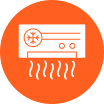AC Repair in St Petersburg and Tampa Bay
Welcome to Hales AC, where we specialize in 24 hour AC repair in Tampa Bay and beyond. For over 37 years, Hales AC has been the leading name in AC repair in Tampa Bay, providing top-notch HVAC services. Whether it’s urgent AC repair in Tampa Bay, routine maintenance or installation, our certified team excels in every task. We understand the importance of a well-functioning air conditioning system in Tampa Bay’s climate, and our commitment to quality service in Air Conditioning repair in Tampa Bay is unwavering.
-
 Same-day service
Same-day service
-
 100% Satisfaction Guaranteed
100% Satisfaction Guaranteed
-
 Flat-rate pricing
Flat-rate pricing
-
 Fully Stocked Service Trucks
Fully Stocked Service Trucks

Why Choose Hales AC for Your Air Conditioning Repair in Tampa Bay?
-
 Expertise in AC Repair in Tampa Bay
Expertise in AC Repair in Tampa Bay
-
 Guaranteed Satisfaction
Guaranteed Satisfaction
-
 Transparent Pricing
Transparent Pricing
-
 Same-Day Service
Same-Day Service
-
 Comprehensive Warranties
Comprehensive Warranties
-
 Maintenance Plan
Maintenance Plan
Expertise in AC Repair in Tampa Bay: Our technicians bring decades of experience in Air Conditioning repair in Tampa Bay. They’re equipped to handle all types of AC issues.
Guaranteed Satisfaction: With Hales AC, every AC repair in Tampa Bay comes with our Gold Standard Guarantee, a 100% satisfaction guarantee.
Transparent Pricing: We offer flat-rate pricing for all Air Conditioning repair in Tampa Bay, ensuring no surprises on your bill.
Same-Day Service: Need quick AC repair in Tampa Bay? We’re here to help at a moment’s notice.
Comprehensive Warranties: Our AC repair in Tampa Bay comes with robust warranties for peace of mind.
Maintenance Plans: To prevent future issues, our maintenance plans for AC repair in Tampa Bay keep your system in top shape.
Proudly Serving The Following Communities
- Belleair
- Belleair Beach
- Belleair Bluffs
- Belleair Shore
- Clearwater
- Dunedin
- Gulfport
- Indian Rocks Beach
- Indian Shores
- Kenneth City
- Largo
- Madeira Beach
- North Redington Beach
- Oldsmar
- Pinellas Park
- Redington Beach
- Redington Shores
- Safety Harbor
- St. Pete Beach
- St. Petersburg
- Seminole
- South Pasadena
- Tarpon Springs
- Treasure Island
- Apollo Beach
- Bloomingdale
- Brandon
- Carrollwood
- Citrus Park
- Dover
- Gibsonton
- Lake Magdalene
- Lithia
- Lutz
- Mango
- Palm River-Clair Mel
- Plant City
- Riverview
- Ruskin
- Seffner
- Sun City Center
- Tampa
- Temple Terrace
- Thonotosassa
- Town 'n' Country

AC or Heat Pump Replacement
When your aging air conditioner is ready for an upgrade,our experts will install the best system for your needs.

AC or Heat Pump Repair
Whether it’s a minor adjustment or major part replacement, you can count on us to get your AC repair in Tampa bay completed in no time.

AC or Heat Pump Maintenance
Our AC maintenance ensures your system runs efficiently so you get the most out of your investment.

Duct Cleaning & Indoor Air Quality
When your aging air conditioner
is ready for an upgrade,our experts will install the best system for your needs.
Hales AC offers a warranty on all of our air conditioning repair in Tampa Bay and surrounding areas.
At Hales AC, we recognize the importance of a reliable warranty for your home’s comfort systems. That’s why we offer a one-year warranty on all air conditioner, heat pump, and heating system repairs for our Comfort Club Members, and a 60-day warranty for non-members. These warranties ensure that any AC repair in Tampa Bay we perform is dependable and high-quality, providing you with peace of mind and protecting your investment in your home’s comfort.
Air Conditioning repair in St. Petersburg, FL
REQUEST A FREE QUOTE AND GET $25 OFF YOUR FIRST BOOKING

Request Service, Duct Cleaning or New System Estimate
Please fill out this quick form and we will be in touch.
-
 Rapid Response: When you need AC repair in Tampa Bay, time is of the essence. We strive to address your repair needs promptly.
Rapid Response: When you need AC repair in Tampa Bay, time is of the essence. We strive to address your repair needs promptly.
-
 Full Range of Services: From minor adjustments to major overhauls, our team is ready for any type of AC repair in Tampa Bay. Year-Round Comfort: With Hales AC, you’re not just getting AC repair in Tampa Bay; you're ensuring comfort all year long.
Full Range of Services: From minor adjustments to major overhauls, our team is ready for any type of AC repair in Tampa Bay. Year-Round Comfort: With Hales AC, you’re not just getting AC repair in Tampa Bay; you're ensuring comfort all year long.
-
 Year-Round Comfort: With Hales AC, you’re not just getting AC repair in Tampa Bay; you're ensuring comfort all year long.
Year-Round Comfort: With Hales AC, you’re not just getting AC repair in Tampa Bay; you're ensuring comfort all year long.
Air Conditioning Repair
Our seasoned AC technicians have been resolving air conditioner and heat pump issues across Florida for over 37 years. Understanding the importance of a functioning AC, we quickly diagnose problems, provide clear, upfront pricing, and aim to complete your AC repair in Tampa Bay on the same day in over 96% of cases. We’ll have your home cool and comfortable in no time.
AC Tune-Up and Maintenance
To keep your home comfortable year-round, regular tune-ups are key. Our comprehensive inspections and maintenance services ensure your HVAC system is ready for both the summer heat and the cooler winter months. Our maintenance plans are designed to extend the life of your unit and give you peace of mind, with regular checks to keep everything running smoothly. Schedule your tune-up online today!
Air Conditioning Installation
Choosing a new AC unit can be daunting, but at Hales AC, we make the process straightforward and affordable. Our free in-home estimates include assessing your current unit to recommend the perfect size and model for efficient cooling. We offer fixed-rate quotes and can often install your new system the same day you choose it. We prioritize care and precision in our installations, ensuring your new cooling system works perfectly from the start.
Right Away
Comfort Club
Membership Plan
Attention homeowners! AC maintenance is essential for keeping your home comfortable and saving on energy costs. That’s why Hales AC offers our Right Away Comfort Club, a membership plan that ensures peak performance for your AC and heating systems all year round. When you sign up, you’ll enjoy front-of-the-line service, extensive annual or bi-annual system tune-ups, discounts on air duct cleaning, indoor air quality products and your AC repair in Tampa Bay. Our expert technicians know all the major brands, giving you peace of mind that your home comfort systems are in good hands. Don’t wait – Join our Comfort Club today and experience the benefits firsthand! See our locations! Air Conditioning Tampa | St Petersburg AC Repair.


Heating
Furnace Repair and Maintenance
Heat Pump Services
24/7/365 SERVICE
Contact Hales AC for AC Repair in Tampa Bay
Need an expert in AC repair in Tampa Bay? Contact Hales AC today. We’re not just a service provider; we’re your partners in maintaining a comfortable, cool home. For all your AC repair needs in Tampa Bay, remember Hales AC – where quality and customer satisfaction come first.


